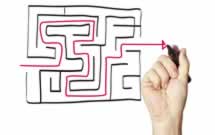What are the characteristics of great problem solvers?
 For the past couple of months, I have been working on adapting the Workshop Model of Reading and Writing instruction to design a course I will offer in our school’s new maker space next year. What I especially like about the workshop model is that it deemphasizes content in favor of building the strategies and habits of mind that make a student an effective reader. The whole “give a man a fish…” metaphor looms large here.
For the past couple of months, I have been working on adapting the Workshop Model of Reading and Writing instruction to design a course I will offer in our school’s new maker space next year. What I especially like about the workshop model is that it deemphasizes content in favor of building the strategies and habits of mind that make a student an effective reader. The whole “give a man a fish…” metaphor looms large here.
It became very clear to me that it could be adapted to almost any subject. It is a really strong model for student-centric, problem-based learning, and I wanted to see if I could apply it to teaching electronics and programming. But the habits of effective readers didn’t make much sense in this context. What are the strategies and habits of mind that I want to impart to my students in an electronics course?
I realized it isn’t the content, but the strategies, which are most important. I want my students to be great problem solvers. I want them to learn how to learn. I wrote the following Strategies for Effective Problem Solvers, which will be the primary learning objectives of my 7th and 8th grade Physical Computing course next year.
(Next page: Ten characteristics of effective problem solvers)
What do great problem solvers do?
They take time to carefully define a problem…
Ineffective problem solvers sometimes go off track because they make assumptions about what a problem requires. An effective problem solver will take the time to ensure that she understands the problem and what it is asking.
They know what they know…
Good problem solvers perform an inventory of what they already know and incorporate that knowledge into their understanding of the problem and in their solution design.
They can figure out what they need to know…
Good problem solvers can identify gaps in their own understanding and articulate those gaps as questions. Good problem solvers are constantly asking themselves , “What don’t I understand about this system, and what do I need to learn?”
They can effectively and efficiently find the information they need…
Good problem solvers are expert researchers. They are well versed and comfortable using all manner of information resources, including classmates. They able to distinguish between reliable and unreliable sources, and can also identify high-quality sources that match their reading and understanding level.
They collaborate…
Good problem solvers view teammates as sources of information and talent. They help teammates to divide tasks equitably and according to one another’s strengths.
They are undaunted by complexity…
Good problem solvers don’t look at a problem as a monolith, and are not overwhelmed by large, complex systems. Rather, they are capable of breaking a problem down into small, discrete, interrelated components, which can be understood and attacked independently.
They model solutions and test them…
Good problem solvers can visualize a solution in their mind. They build digital simulations and physical models. They use these models to test the functionality of their solutions following a methodical process to troubleshoot their solutions.
They produce multiple, divergent, and creative designs…
Effective problem solvers are good divergent thinkers. They can imagine multiple and varied possible solutions. A soda cap could be a wheel, a dial, of a shield for a toy soldier for example.
They persist through ambiguity, challenges, and setbacks…
Good problem solvers stay with problems for a long, long time. Challenges and setbacks are met with a positive attitude and as an opportunity to explore new paths with a clean slate.
They evaluate the quality of their solutions with brutal honesty and make revisions…
Good problem solvers have an idea of what the solution to a problem should look like. Throughout the process, they measure the quality of their work against that mental model and these standards.
At this point, you might be thinking: “These aren’t strategies for problem solving per se, they are really strategies for being a good student.”
I would have to agree. I frame them as problem solving strategies because I envision my students engaging with my course material as problem solvers, and these are the skills that are most important to me in the course. I envision my students engaging with my course material as problem solvers, and these are the skills that are most important to me in the course. I truly don’t care if my students remember the difference between a resistor and a capacitor when they leave my classroom for the last time. I do care very much that they demonstrate significant growth in each of these strategies.
Trevor Shaw has worked as an ed-tech leader, speaker, writer, consultant, and classroom teacher for over 20 years. He is currently the director of technology at the Dwight-Englewood School and can be reached at @shawt, +TrevorShaw, and shawt@d-e.org.
- How digital tools and AI can enhance social studies - April 23, 2024
- Using universal screening to improve student well-being - April 22, 2024
- 3 ways to avoid summer learning loss - April 19, 2024


Comments are closed.